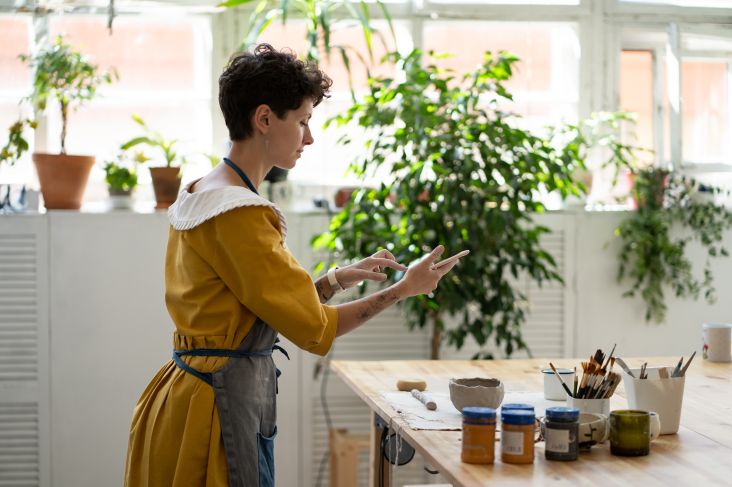Work for yourself? Here's how to work productively from home as a sole freelancer
When I tell people I work from home a few days a week, I either hear one of two responses. The first – “how do you do it?” often followed by “I’d just watch television all day”. And the second – “I’d love to do that, I wouldn’t even bother getting dressed”.
](https://www.creativeboom.com/upload/articles/e5/e5267b1b5a615bf6d6cf2bb9ca0181401a3cf496_1280.jpeg)
Image courtesy of Adobe Stock
In theory, working from home is the dream. You can sit and work in your pyjamas if you feel that way inclined. You’re ten steps from the kitchen, so if you fancy a snack, then you can go for it – if no one sees you eat a chocolate bar, it doesn’t count. And when it comes to your playlist, the world’s your oyster. Have an urge to listen to Steps? No problem. I’m listening to Kisstory as I write this.
However, it’s not all carbs and carefree pop music. Working from home can be tough. There are a lot of things to consider, such as how will you cope when you need to make a quick decision, and there’s no one there to consult? Will you be able to stay focused for seven hours per day, without gravitating towards the television remote? And can you retain a level of professionalism, when working from your private space?
As I’ve been successfully working from home for six months now, I wanted to share my tips for making remote working productive. You’ll never need to work in an office again.
Assign a section of your home specifically for working
When you first start working from home, it can be tempting to use your laptop in bed or on the sofa. While this is fine on the odd occasion, doing this often can make it difficult to distinguish between work time and downtime. You might start to associate places of relaxation with work, which, as we know, can lead to reduced productivity and eventually burnout.
Set up a desk, monitor and a good quality chair – appropriately adjusted to the correct heights to avoid neck and back problems. Have a phone that’s specifically for work enquiries, so you can switch it off in the evenings and at weekends. And make sure you turn your computer off at the end of the working day to avoid quick email checks – this also helps to symbolise the end of work and the beginning of your downtime.
Shower and dress first thing every morning
It might seem trivial, but home working can quickly lead to laziness. Without a physical office to go to, it’s easy to become bound to your dressing gown. Although it’s essential to be comfortable, failing to get dressed again blurs the boundaries between work and play – encouraging a lack of professionalism and making your downtime less enjoyable. Luckily for me, I have regular meetings, which take me out of my city-centre flat and into the ‘real world’. However, even if you’re not in a client-facing job, this is perhaps the piece of advice I’d deem most important to enhancing your productivity.
Take regular breaks
A common issue many faces with home working is feeling as though they need to work harder to prove they’re not slacking off. When working in an office environment, it would quickly become evident if someone was visibly avoiding work; however, in the virtual world of home working, no managers are breathing down your neck.
It's slightly different from freelancing, but the same principles apply – clients are always keen to know where their money is being spent.
With that in mind, no one expects an employee or freelancer to work for nine hours a day without breaks – it’s unproductive and leads to mistakes. So if your eyes are feeling tired, go and make a cup of tea, or do 10-minutes of meditation. You wouldn’t feel guilty taking your lunch break in an office, so apply the same principles to home working.
Consider working from places other than your home
When working from home, it’s normal to get cabin fever sometimes. To deal with this, why not work from a local coffee shop one morning per week? If you struggle with noise, take some headphones and save your less intense tasks for this time. If you’re based in a city, this also presents an excellent opportunity to meet other likeminded people. You might even get a new project or client out of it.
Make sure you get fresh air and exercise regularly
When you work in an office, chances are you’ll have some commute. This means that even if you don’t do any other exercise, you’re always getting some regular walking done. But if you work from home, you only have to roll out of bed and into your home office, or in my case, living room desk.
In the winter, it can feel as though you haven’t seen sunlight for weeks, as it’s dark when you wake up and similarly before you finish work. Therefore, it’s essential to get out and about before or after the working day. Why not go for a run in the morning? Or walk to a local pub when you finish for a pint with friends? It will make all the difference.
My main piece of advice is not to be afraid of working from home. With a little discipline and a loose structure, I guarantee you’ll be as productive, if not more so, than working in an office environment.














](https://www.creativeboom.com/upload/articles/0c/0c4eb84a3d8112c994a45f84e88a9629563248da_732.jpeg)
](https://www.creativeboom.com/upload/articles/e7/e7cafab030d31c8263cf954f5cd38f1a3be6349d_732.jpeg)


](https://www.creativeboom.com/upload/articles/6f/6f1a2330ea0c42ecd0bd0f9a19be5f540a0aa96e_732.jpeg)



